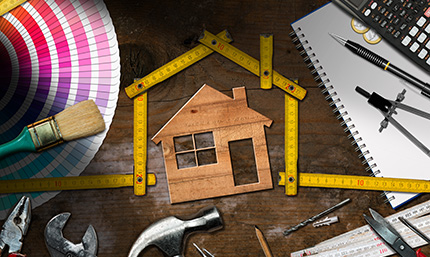News & Tips
How Does a Home Equity Line of Credit Work? A Guide to HELOC Loans

How Does a Home Equity Line of Credit Work? A Guide to HELOC Loans
Most people have heard of a Home Equity Line of Credit (HELOC), but you may not be as familiar with how they work. In today’s deep dive, we’re going to explore all the ins and outs of this fantastic loan vehicle for homeowners to get the cash they need to do repairs, renovations, and more—all based on the equity they already have in their home.
What is a HELOC?
Home equity lines of credit allow you an opportunity to access a certain amount of cash depending on the value of your home. HELOCs let homeowners make draws from this line of credit as needed and to then repay in installments or in full each month. Drawing as needed and paying based on your financial situation makes this setup similar to that of a credit card. With a credit card, you have a credit limit that you can “draw on” and then decide how much of that you want to pay off each month.
HELOCs allow you to borrow money based on the amount of equity you have in your home. Equity is the total amount your home is worth today minus however much you still owe in principal on your mortgage. For example, if you have a home worth $400,000 and have paid down the mortgage’s principal balance to $200,000 over the years, you now have $200,000 in equity built up in your home, which can be put to use by utilizing loan vehicles like HELOCs.
The Inner Workings of a Home Equity Line of Credit
As we just covered, a HELOC works something akin to a credit card where you can borrow based on your credit limit as often as you need to. A HELOC allows you the option, rather than the obligation, to borrow as-needed and when needed. The home equity line of credit can be drawn on as often as it is needed in a set timeframe, followed by a repayment-only period.
Almost all HELOCs are available with an adjustable rate, which means the rate can go up or down based on a benchmarked rate. When a HELOC is first established, your lending institution will start with this benchmarked rate and then make adjustments to your final rate based on different financial factors including your employment history, income information, and credit score.
A borrower always has the option to see their rate ahead of time before they decide to move forward with a decision. Take this time to do your research and find which lender can provide you with the best terms for your unique situation. Remember, unlike a credit card or personal loan, a HELOC from a credit union typically allows you to access funds at far lower rates.
Qualifying for a HELOC
When you are first applying for a HELOC, there are several different factors that a personal mortgage representative will look into as they evaluate an individual for a HELOC qualification. Mortgage specialists make these determinations to ensure that the individual’s financial situation is such that the addition of a HELOC is not going to create a financial burden.
To do this, a financial analysis is performed utilizing data such as:
- Home Equity: In order to qualify for a HELOC, you will have to have built up equity in your home. Remember that equity is the difference between your home’s value and the outstanding principal. Different lenders have different requirements for the amount of home equity that is required, but generally you will need to have an equity amount of at least 15 to 20 percent of the home’s appraised value to qualify. If you just moved into a brand new home and have not yet paid much of your mortgage principal down, it is highly unlikely you will have the equity needed to qualify for a HELOC.
- Credit Score: Whenever you apply for just about any loan on the planet, a credit check is going to be a key part of the process. Lenders pull your credit report to see a glimpse into your financial wellbeing. A personal mortgage representative will look at your score, the percentage of payments you’ve made on time, how much credit you’re using compared to your total limits, any derogatory marks like collections or bankruptcies, the average age of your open accounts, how many accounts you have, and even how many times you’ve applied for various forms of credit.
- Debt-to-Income: The debt-to-income (DTI) ratio is a really important factor when applying for a HELOC because it helps determine what the borrower can reasonably afford given how much income they bring in. Whenever you first applied for your mortgage, a mortgage specialist would have run a DTI ratio analysis to get a better idea of how taking on more debt will affect your financial situation.
- Generally speaking, your total debts should not exceed 43 percent of your total income on a home loan but there is leeway here based on different factors. Some lenders may go as high as a 50 percent DTI depending on the individual’s situation.
- Payment History: Lenders look into how quickly you have been able to pay your bills over the last few years to make sure that you can keep up with a new payment. If you have had trouble in the past, take a little time to establish a steady stream of on-time payments to show that you are making progress in this area, which can help bolster your application.
- Employment History: Employment history, like payment history and income verification, is looked at to make sure that your present situation is not a tenuous one, i.e. that it is likely you will continue to be gainfully employed for the life of the HELOC such that you will be able to make your payments without undue pressure on your finances.
When you are considering applying for a HELOC through SCCU, we like to make the process as easy and transparent as possible so that you can always make a good decision for your unique situation. A great tool to help you as you explore your options is our convenient home equity calculator found on our calculators page. Use this tool to better understand how a HELOC will play into your financial situation as a whole.
The Process of Getting a Home Equity Line of Credit
Qualifying for a HELOC and then deciding to move forward in the process can seem daunting but our team is here to help you through every step of the process. When it comes down to applying for your HELOC, there’s some steps you should look to follow that can make the whole process a lot easier including:
- Know What You Can Borrow: First, make sure you qualify using our equity calculator above. The equity calculator can help you determine whether you have sufficient enough equity in your property to move forward in the first place.
- Shop Around: Knowing how much you can reasonably borrow based on the equity in your home provides you with more leverage to be able to shop lenders. We encourage every applicant to explore their opportunities because we’re confident our HELOCs provide one of the very best combinations of affordability and ease of access available.
- Get Information Together: Make sure to spend some time gathering the necessary information you will need for the application process. Set up a secure folder with all of the pertinent information available right where you need it. Some of the information you will need includes you and any co-borrowers social security numbers, income information, employment history, current mortgage balance, and bank and/or brokerage account statements.
- Know the Terms: SCCU makes the application process super easy with fast pre-approval decisions either online or over the phone. There’s also no hidden terms or fees and no closing costs so you can enjoy an easier way to access your money. With any HELOC program, make sure you understand the terms that are being provided to you in the disclosure agreements. If there’s anything you don’t understand, just ask your SCCU personal mortgage representative and they will be more than happy to answer all your questions.
- Actually Applying for a HELOC: SCCU members get the advantage of a streamlined HELOC application process with our Express Sales Associates. The application is taken online or over the one and then reviewed by a personal mortgage representative, who is typically able to get back to the borrower within just one business day. The Express Sales Team can be reached from 8:00 a.m. to 6:30 p.m. Monday through Friday and from 9:00 a.m. to 3:00 p.m. on Saturdays.
- Understand the Underwriting Process: Most of the time a HELOC will require a home appraisal to figure out the current market value of the home. A loan officer takes all of this information and the information submitted in your application to make a final determination on the new HELOC.
- Getting Ready for Closing: Once all of the calculations are complete and everything checks out, a closing will be scheduled for your HELOC. Much like the closing for a new home, there will be a lot of paperwork to sign with many of the forms requiring a notary's signature. Remember, the notary will verify you are who you say you are and will need to see a current driver’s license for all borrowers on the application.
SCCU strives to make the process of obtaining a HELOC as easy and straightforward as possible because we know how important these funds are to you. Make plans for a new home renovation, consolidate debt, even fund a new purchase—the equity in your home can be put to good use with a new HELOC.
Maximum Amounts You Can Borrow with HELOCs
The maximum amount that you will be able to borrow in the form of a HELOC will depend on the lending institution and the specific loan program you are going with. The lending institution will look at the value of your home and the percentage that they will allow you to borrow against based on what you still owe on your present mortgage.
Knowing the present value found during the appraisal process helps determine a ratio known as combined loan-to-value for the property. The steps to figure out a basic understanding of how much home equity you can borrow is fairly straightforward. Simply take your home’s value (what was found during the appraisal) and multiply this by the maximum percentage value that the lender allows to get the maximum amount of equity that could potentially be borrowed. Then just subtract the amount of outstanding principal remaining on your mortgage to give you a better idea for how much you can borrow in your new home equity line of credit.
Run the numbers - As an example, if a lending institution says they’ll extend a maximum of an 85% LTV (loan-to-value), then for a $400,000 house, with $200,000 left on the mortgage, a borrower may qualify for a HELOC of up to $140,000. The calculation for this would be as follows: $400,000 x 0.85 = $340,000 - $200,000 = $140,000.
Now, equally important to the upper ceiling of what you can borrow in a HELOC is knowing the minimum loan amount set by the financial institution as some lenders put fairly high minimums on home equity lines of credit. With SCCU, we use a low $5,000 minimum loan amount to make it as convenient as possible for our members to get exactly what they need out of their new HELOC.
Paying Off a Home Equity Line of Credit
All HELOCs come with two distinct life cycle phases including a draw period and a repayment period. SCCU has created two different HELOC loan programs to provide the best options for individual borrowers: a 7/7 principal-and-interest HELOC and a 10/10 interest-only HELOC.
- 7/7 Principal-and-Interest HELOC:With a total term of 14 years, hence 7/7, the first seven years allows the borrower to draw against the HELOC and utilize those funds however they see fit. The borrower will need to make monthly payments with rates against the outstanding balance. During these first seven years, whenever a payment is made the outstanding balance drops and the available credit is therefore replenished, much like a credit card. The replenished credit can be drawn again and utilized again throughout the first seven years.
- After the first seven years are up, the borrower enters the repayment period where they won’t make any additional draws and instead will repay the remaining balance in monthly installments. The interest rate for this balance will remain variable, which means it can fluctuate according to the benchmark rate. A really cool feature of SCCU’s HELOCs is that if the rates become more favorable, you can always refinance the credit line or convert it to a fixed home equity loan.
- 10/10 Interest-Only HELOC: With the interest-only HELOC option, the total term is 20 years. The first 10 years constitute the draw period and act like the 7/7 HELOC but the minimum monthly payments are set based on the accrued monthly interest. A borrower can choose to pay more than the interest-only payment to lower their outstanding balance and thus free up the credit to be utilized again. After the first 10 years, the balance is paid in monthly installments. Like the 7/7 HELOC, the borrower may choose to take advantage of refinancing or renewal options or even convert to a new home equity loan.
Keep in mind with most HELOCs, a balloon payment may be required at the end of the repayment period for any remaining principal.
| Term | 12 Month Intro Rate APR* "As Low As" | Thereafter APR* "As Low As" |
|---|---|---|
| Principal-and-Interest Option 7/7 |
4.24% | 6.25% |
| Interest-Only Option 10/10 |
7.00% | 7.00% |
Special Introductory Rate valid on Principal-and-Interest HELOC for 12 months. Thereafter, the HELOC will have a Variable Rate feature as described below. Introductory rate not available on Interest-Only HELOC.
Your actual interest rate will be based on the available equity in your home, the amount of your loan, your credit history, and product chosen. Other programs, rates, and terms may be available. Approval is subject to our usual credit criteria. Proof of homeowner’s insurance sufficient to cover all outstanding mortgages, including your SCCU equity loan, and any other obligations secured by the home and property, is required. Certain restrictions may apply.
No Closing Costs (Home Equity Loans): SCCU will waive typical third-party fees associated with closing a Home Equity loan, such as appraisal, photo inspection, recording, state tax stamps, title exam, and title insurance. Must be primary residence. Available on loans up to $250,000. For Fixed-Rate Home Equity Loans (2nd Mortgages) in the first lien position, valued at $50,000 or more, waived costs do not include prepaid escrow amounts. Additional fees may apply for loans over $100K, and/or for special Deed preparation requirements.
You must already be a member of the credit union, or establish membership, which requires a one-time $5 deposit to open and maintain a regular savings account. Offers and rates subject to change at any time.
Current Prime Rate
Principal-and-Interest HELOC
As low as Prime minus 0.50% w/floor (minimum rate) and ceiling (maximum rate) of 18.00%
Term: 14 years, the first 7 years you may draw against/utilize the credit line similar to that of a credit card and are required to make a monthly payments equal to 1.5% of your outstanding balance, with a $100 minimum. During these first 7 years, like a credit card, as you pay your outstanding balance your available credit will be replenished and may be drawn against/utilized again. Your available credit equals maximum credit line minus total outstanding balance. During the final 7 years you may no longer draw against/utilize the credit line. Whatever balance remains at the end of the first 7 years must be paid in monthly installments. Required monthly payment equals 1.5% of the prior month's balance, with a $100 minimum payment. There is a possibility of a balloon payment at the end of the repayment period. Once the monthly minimum payment due is satisfied, you may choose to make additional payments toward the principal. The interest rate is still variable, thus monthly payments will vary depending on the current interest rates. However, as an option you may refinance to renew your credit line or convert to a fixed home equity loan.
Interest-Only HELOC
As low as Prime plus 0.25% w/floor (minimum rate) and ceiling (maximum rate) of 18.00%
Term: 20 years, first 10 years you may draw against/utilize the credit line similar to that of a credit card and are required to make minimum monthly payments equal to accrued monthly interest determined by the current interest rate and your outstanding balance. During these first 10 years, if you choose to pay more than your interest-only payment, thus lowering your outstanding balance like a credit card, your available credit will be replenished and may be drawn against/utilized again. Your available credit equals maximum credit line minus total outstanding balance. During the final 10 years you may no longer draw against/utilize the credit line. Whatever balance remains at the end of the first 10 years must be paid in monthly installments. Each monthly payment includes principal and interest, and equals 1.5% of the prior month's balance, with a $100 minimum payment. There is a possibility of a balloon payment at the end of the repayment period. Once the monthly minimum payment due is satisfied, you may choose to make additional payments toward the principal. The interest rate is still variable, thus monthly payments will vary depending on the current interest rates. However, as an option you may refinance your credit line or convert to a fixed home equity loan.
Deciding if a HELOC is Right For You
A HELOC can be a really useful financial vehicle for gaining access to the necessary funds to accomplish a wide variety of tasks. Whether or not it is right for each individual borrower depends on their unique situation and the goals and aspirations they have. At SCCU, we take banking personally because it is personal. Our personal mortgage representatives will help you walk through all of the advantages and disadvantages of a HELOC to help give you the best idea of whether this decision is right for you.
A HELOC is a great way to pay for home repairs or renovations because these will often increase the value of your home. When looking at financial freedom as a whole, a HELOC can be a useful tool in helping you achieve your goals. However, you can also look at the pros and cons of cash out refinancing vs. a HELOC loan.
Locking in a Great Rate on a Home Equity Line of Credit
In a low interest environment, a HELOC can be a fabulous tool since it's based on a benchmark interest rate. As we’ve stated and will continue to hone in on, credit unions are able to offer some of the very best rates on HELOCs and other loan vehicles. One reason for this is that we operate as a not-for-profit credit union, which means under Florida law we don’t have to pay certain fees and taxes. We pass this savings right along to our members in the form of lower fees and better rates. Here are our top tips for getting the best HELOC rates.
With our HELOC program we also offer no closing costs, no hidden terms or fees, and no prepayment penalties. When all these benefits start stacking up, it’s easy to see why so many trust credit unions like SCCU for the best rates and best terms on a new HELOC.
Do HELOCs Affect Your Credit Score?
During your application process, a lending institution will need to pull your credit report, which does affect your credit score. As well, different credit bureaus have different rules for a HELOC of a certain size and can treat them as if they were an installment loan instead of a line of credit. Maxing out a HELOC in these instances might mean that you're getting the same negative effect as if you completely maxed out your credit card.
Just like any new form of credit, the addition of a new HELOC can drop your score for a time as the age of your credit is reduced. However, over the long term and by making all the payments you need to and not maxing out the credit available, a borrower can actually serve to increase their score.
Difference Between a HELOC and a Home Equity Loan
Also known as a second mortgage, a home equity loan is another useful financial instrument that behaves a little differently than a HELOC. Home equity loans are typically made available with a single lump sum just like a car loan or other types of loan vehicles. A home equity loan also has a fixed rate rather than a variable rate seen with a HELOC.
A fixed rate can be useful in helping a borrower know exactly what they will be paying over the life of the loan. A huge advantage of the home equity loans we offer at SCCU is no closing costs, no hidden terms or gees, fast pre-approval decisions, and absolutely no prepayment penalties.
Going Over the Numbers with a Loan Specialist
The best news of all is that you will never be alone throughout this process. We'll be happy to answer any questions and cover all your options to find the right loans for your unique situation.
































